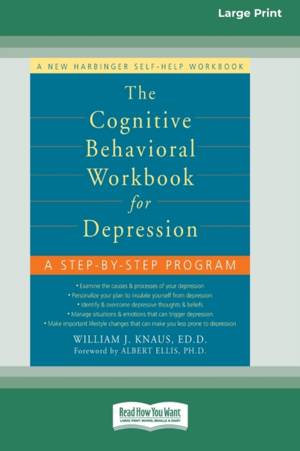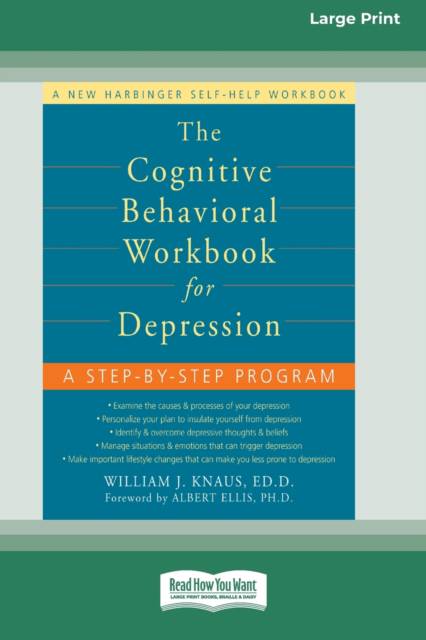
- Afhalen na 1 uur in een winkel met voorraad
- Gratis thuislevering in België vanaf € 30
- Ruim aanbod met 7 miljoen producten
- Afhalen na 1 uur in een winkel met voorraad
- Gratis thuislevering in België vanaf € 30
- Ruim aanbod met 7 miljoen producten
Zoeken
The Cognitive Behavioral Workbook for Depression (16pt Large Print Edition)
William J Knaus
Paperback | Engels
€ 77,45
+ 154 punten
Omschrijving
Do you think that you could lessen or overcome your feelings of depression if only you had the right tools? Are you ready to help yourself stop feeling depressed? If so, then you've found a powerful resource. The Cognitive Behavioral Workbook for Depression is a complete, comprehensive, step-by-step approach you can use, on your own or working with a therapist, to manage and conquer depression. Using techniques from cognitive behavioral therapy (CBT) and rational emotive behavior therapy (REBT), you'll develop a plan for breaking your cycle of depression. You'll learn to recognize and dispute the irrational thoughts and depressive beliefs that keep you feeling down. You'll also discover ways to guard against emotions that often occur with depression, like anxiety and anger..... The tools and strategies in this book will certainly help you better understand yourself and move out of the misery of depression.-Timothy A. Pychyl, Ph.D., associate professor of psychology at Carleton University in Ottawa, Canada, and director of the Procrastination Research Group Bill Knaus has hit the bullseye! From a horde of scientific studies and his own extensive experience, he has distilled an accessible, easily assimilated, pragmatic, and schematic approach to dealing with 'parasite' anxieties. Readers can work through this program in small bites to gradually advance their control over their destructive anxieties.
Specificaties
Betrokkenen
- Auteur(s):
- Uitgeverij:
Inhoud
- Aantal bladzijden:
- 788
- Taal:
- Engels
Eigenschappen
- Productcode (EAN):
- 9780369370358
- Verschijningsdatum:
- 7/05/2010
- Uitvoering:
- Paperback
- Formaat:
- Trade paperback (VS)
- Afmetingen:
- 156 mm x 234 mm
- Gewicht:
- 975 g

Alleen bij Standaard Boekhandel
+ 154 punten op je klantenkaart van Standaard Boekhandel
Beoordelingen
We publiceren alleen reviews die voldoen aan de voorwaarden voor reviews. Bekijk onze voorwaarden voor reviews.











